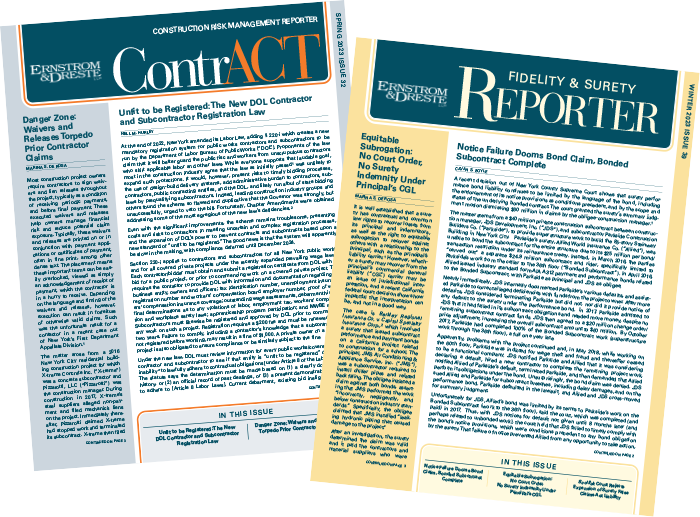Article by: Nell M. Hurley
Surety counsel and claims professionals alike may be surprised by the recent ruling of a Kings County, New York trial court. The court denied a surety’s summary judgment motion for breach of an indemnity agreement but not for the reason you might expect, like an issue of fact. Instead, the court held that because the surety failed to lay the foundation for the admissibility of the business records submitted in support of its motion, the records were not admissible, requiring denial of the surety’s motion.1 Typically such summary judgment motions are made, and granted, based upon the affidavit of a surety claims professional with personal knowledge of the underlying surety payments and expenses, just as the surety did here.
The matter arose from a 2011 standard industry indemnity agreement executed to secure bonds for construction projects, requiring the indemnitors to pay for losses, expenses, and attorneys’ fees the surety incurred under the bonds. By 2022, the surety had incurred all three and sought recourse under the indemnity agreement against the indemnitors by filing suit for over $400,000.
A year later, the surety moved for summary judgment in the customary fashion: The affidavit of the surety claims professional explained the claim and attached supporting documentation,2 based upon personal knowledge and review of the surety’s files.3 In response, the indemnitors made a conclusory argument regarding an alleged statute of limitations defense, but also argued that the documents provided through the surety claims professional’s affidavit were inadmissible since they failed to meet the foundational “business records” requirements as an exception to the hearsay rule under New York’s civil practice rules.4
The surety maintained that the business records exception was inapplicable where, as here, the person submitting the evidence has personal knowledge of the facts stated in, and the documents attached to, the affidavit. Moreover, argued the surety, governing appellate law has specifically rejected the applicability of that business records rule to a surety’s summary judgment motion on an indemnity agreement because of a prima facie evidence clause it contained, which was identical to the one in this case. The clause states:
…the vouchers or other evidence of any such payments made by the [s]urety shall be prima facie evidence of the fact and amount of the [indemnitors’] liability to the [s]urety.
That appellate court concluded:
“…the…surety’s submission of the documentation demonstrating its payment on behalf of the [indemnitors], as well as an itemized list of expenses paid in connection therewith and the affidavit of personal knowledge by the [surety’s] Senior Managing Claims Counsel, was sufficient admissible evidence to demonstrate the [surety’s] prima facie entitlement to judgment as a matter of law [for contractual indemnification]…”5
Nonetheless, the motion court was unpersuaded by the surety’s arguments, concluding that the claims professional’s affidavit “fails to lay the proper foundation for admissibility for the business records relied upon” by the surety, citing to a mortgage foreclosure case, and leaving the issue of the prima facie clause unaddressed.
So where does this leave the surety and its counsel when seeking summary judgment in this situation? It may be that the pro forma referencing of the claims professional’s personal knowledge and the review of the surety’s files draws attention to the documents’ submission for the truth of their contents, potentially implicating the business records rule. Thus, if raised by the indemnitor, the admissibility of the records could be vulnerable, as they were here, despite the personal knowledge of the affiant, the prima facie clause and cases favorable to the surety on the issue. In any event, the safest course is to add a few paragraphs to the claims professional’s affidavit that ensure that the documents attached are authenticated, and the proper foundation laid for each type of business record, so as to comply with the jurisdictional requirements for admissibility. Not a very heavy lift, even if arguably unnecessary. Better safe than sorry.
- Liberty Mut. Ins. Co. v. Active Fire Sprinkler NYC LLC, 2023 WL 6444621 (Sup Ct, Kings County 2023).
- Included were the indemnity agreement, the applicable bonds, documents of payments made and credits received, and a settlement agreement reached with other indemnitors.
- An attorney affiirmation and Memorandum of Law in support were also submitted.
- NY CPLR R. 4518 (a) requiring that: (1) the record be made in the regular course of business, reflect a routine business activity and be needed in the performance of the business, (2) it is the regular course of the business to make the record; and (3) the record was made at or about the time of the event being recorded.
- Int’l Fid. Ins. Co. v. Kulka Constr. Corp., 100 AD3d 967, 968 (2d Dep’t 2012).




